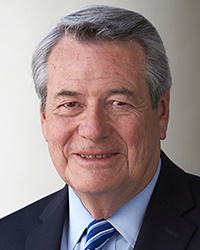Stanford Owen

There are some non-traditional students at Boyd. I consider myself a non-traditional professor.
My association with the Boyd School of Law began in 2006. Since that time, during non-pandemic times, I have commuted one day a week by air to and from Salt Lake City, Utah. So, I am not a traditional professor because I only spend a few hours a week at the law school. I teach other days of the week at the J. Reuben Clark Law School at Brigham Young University.
What is the approach you take to each of the classes you teach?
I teach three separate courses each year. Antitrust, Pretrial Litigation, and Civil Discovery. I love teaching each of these, but each presents its own challenges.
DISCOVERY
“If there is a hell to which disputatious, uncivil, vituperative lawyers go, let it be one in which the damned are eternally locked in discovery disputes with other lawyers of equally repugnant attitudes.”
Dahl v. City of Huntington Beach, 84 F. 3d 363, 364 (9th Cir. 1996).
My approach in teaching Civil Discovery is to teach young lawyers to be civil and cooperative while yet representing their clients diligently. The above quote unfortunately has been an accurate reflection of litigators’ attitudes historically. Things have now changed.
The Federal Rules of Civil Procedure have been amended to bring about a change in the attitudes and practices of lawyers engaged in Civil Discovery. With the advent of Initial Disclosures which require immediate mutual exchange of witnesses and documents, as well as the requirement to “meet and confer” with opposing counsel prior to bringing discovery disputes to the court, and in addition limitations on the number and length of Depositions and Interrogatories, Civil Discovery is now more “civil”.
To teach these new discovery principles, I have frequent and extended breakout groups of 3 to 4 students who conduct model discovery against one another. I move about from small group to small group assisting the students to prepare and answer Interrogatories, Requests for Production of Documents, and Requests for Admissions. A large group setting makes it difficult for individual learning. I have found great success in the small breakout group format.
Electronically Stored Information or ESI has added new dimensions to civil discovery. In many cases today instead of physically exchanging hardcopy documents over which young lawyers have toiled to remove possible privileged documents, now computer algorithms sort the documents and make those decisions. As you might imagine this brings with it a host of new discovery issues, including “claw-back” agreements allowing return of inadvertently produced privileged documents. And remember when you push the delete button on your computer the information is never truly deleted.
So civil discovery is more civil but very different from the discovery of a few years ago.
ANTITRUST
A once-moribund subject, antitrust is now exciting with the advent of newly filed cases against large corporations, and lawsuits involving the name image and likeness (NIL) of amateur athletes. These new cases have breathed life into the subject of antitrust. Stay tuned for major developments in these areas.
PRETRIAL LITIGATION
In Pretrial Litigation students prepare a Memorandum in Support of a Motion to Dismiss, usually 25 to 30 pages in length, and argue the motion in a mock trial setting. Although review of the motions and watching all the arguments is a bit tedious, I am continually amazed at the performance of the UNLV students. Their writing is truly amazing, in most instances, and their oral advocacy is outstanding.
I feel it a privilege to be able to associate with the UNLV law students in these three areas of learning.
My association with the diverse Boyd students motivates me and inspires me to continue teaching.